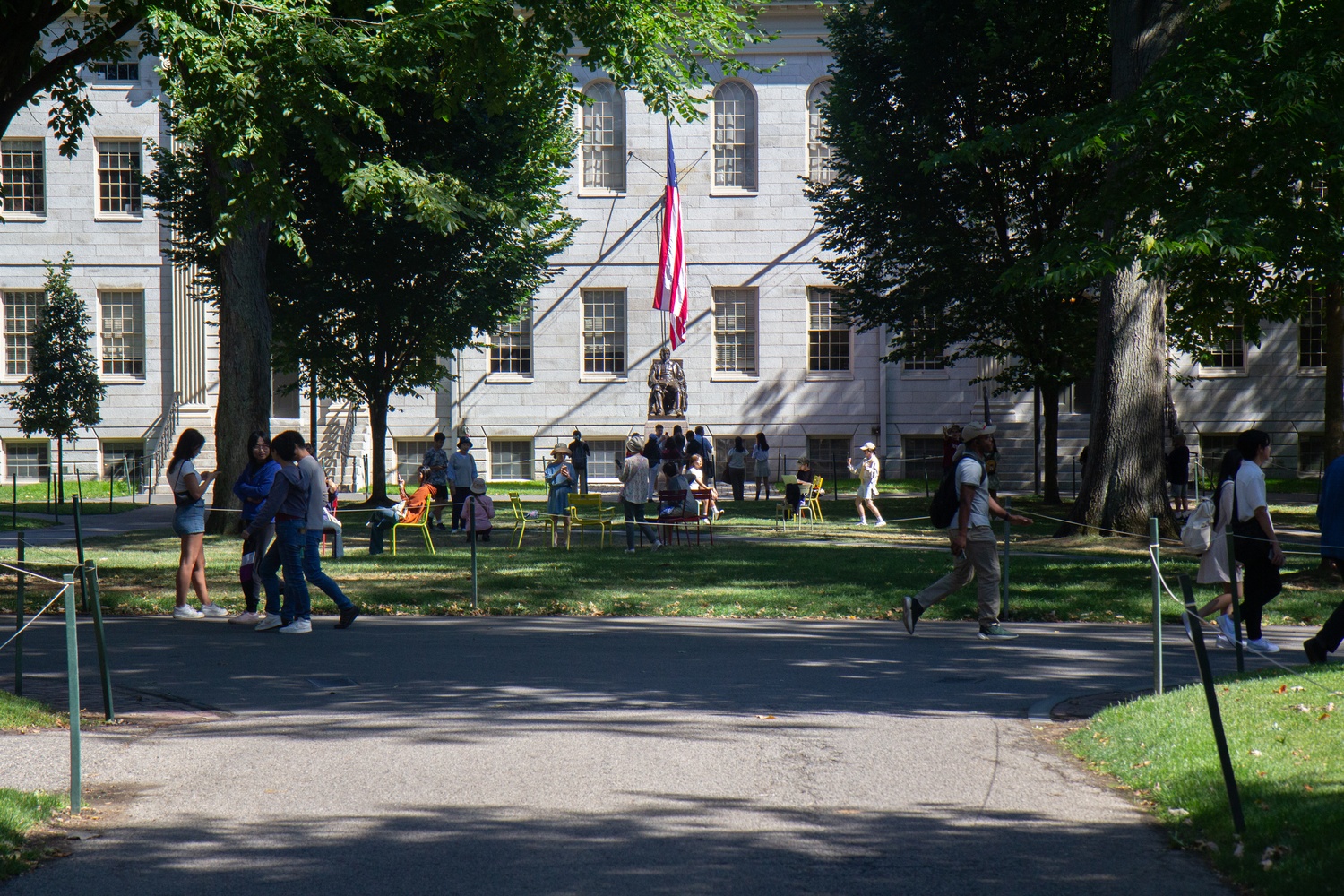
News
Summers Will Not Finish Semester of Teaching as Harvard Investigates Epstein Ties

News
Harvard College Students Report Favoring Divestment from Israel in HUA Survey

News
‘He Should Resign’: Harvard Undergrads Take Hard Line Against Summers Over Epstein Scandal

News
Harvard To Launch New Investigation Into Epstein’s Ties to Summers, Other University Affiliates

News
Harvard Students To Vote on Divestment From Israel in Inaugural HUA Election Survey
Deming Puts Positive Spin on Harvard College Diversity Office Closures, but Acknowledges Outside Pressure

Harvard College Dean David J. Deming told students that the College can no longer host programming targeted at specific races or identity groups during a presentation to Peer Advising Fellows last week — telling attendees he assumed they already understood why the change was necessary.
Deming gave no indication that the College would limit its recognition of student-run affinity groups, which have long been prohibited from limiting membership on the basis of protected characteristics like race and gender, but his remarks indicate that the College’s removal of diversity programming could go further than the closure of the its offices for minority students, LGBTQ students, and women.
Deming did not mention the Trump administration by name during the session, but he gave the clearest acknowledgement to date that the office closures — which occurred in late July —were motivated by external pressures, according to several PAFs who attended the talk.
This account is based on interviews with seven PAFs in attendance. A Harvard College spokesperson declined to comment.
In explaining the changes, Deming repeatedly stated that the College was facing constraints from outside the University. But he did not elaborate on what they were, or why changes had to be made, according to attendees.
The Trump administration has leaned on novel legal interpretations in its campaign to end DEI programming across U.S. higher education, often describing it as a program of racial preferences in violation of federal civil rights law.
In January, President Donald Trump ordered federal agencies to pressure private entities to drop DEI programs. A February letter from the Department of Education warned that programs that “teach students that certain racial groups bear unique moral burdens that others do not” were discriminatory. And in July, the Department of Justice took aim at a litany of college programs — scholarships designated for minority students, identity-based “safe spaces,” and DEI trainings that invoke concepts like white privilege or toxic masculinity.
The White House has honed in on Harvard as a target in its crusade against DEI. In April, the Trump administration demanded that the University dismantle DEI programming in order to keep billions in dollars of federal research funding.
While Harvard sued the administration over the list of demands and never explicitly acceded to that condition, the University has systematically scrubbed the language of diversity from official sites and restructured or closed diversity offices in the months since. Harvard College’s offices supporting LGBTQ students, women, and minority students were shuttered over the summer and folded into a new “Harvard Foundation,” based out of a basement space that had previously housed the Foundation for Race and Intercultural Relations.
Last week, the College quietly rolled out plans to turn two other basement offices — which previously housed the Office of BGLTQ Student Life and the Women’s Center — into event spaces that student groups could book through the new Foundation. Affinity groups will not be able to receive grants from the Foundation except for events that are clearly marked as open to all students.
The College also announced last week that it will no longer designate residential proctors and tutors to serve in dedicated support roles for LGBTQ and first-generation or low-income students.
Deming said in the talk with PAFs that the Harvard Foundation and Office for Culture and Community — which replaced the College’s pre-existing diversity office — would focus on interchange between students with distinct identities, rather than matching students with or allowing them to seek out services based on identity. He said it was valuable for students to receive support from peers or staff with different backgrounds.
When students asked Deming why Harvard could no longer embrace identity-based programming, he said the College wanted to emphasize that its centers are intended to support all students, rather than dedicated for some and marginalizing others.
Deming said the College must continue its work around supporting students’ individual needs while it adapts to a challenging external environment, but he never referred directly to Trump — and did not acknowledge the apparent correspondence between the College’s changes and his administration’s demands.
During the presentation, Deming outlined several other priorities for the College, many of which align with those of his predecessor, Harvard Business School and Sociology professor Rakesh Khurana, who left office in July.
Deming said he would focus on recentering academics — and that he hopes to make the Gen Ed program the “crown jewel” of students’ academic experience.
He also pointed to student services, such as dining and transportation, and developing guidelines for generative artificial intelligence use as priorities for the start of his term.
—Staff writer Cam N. Srivastava can be reached at cam.srivastava@thecrimson.com. Follow him on X @camsrivastava.
Want to keep up with breaking news? Subscribe to our email newsletter.
